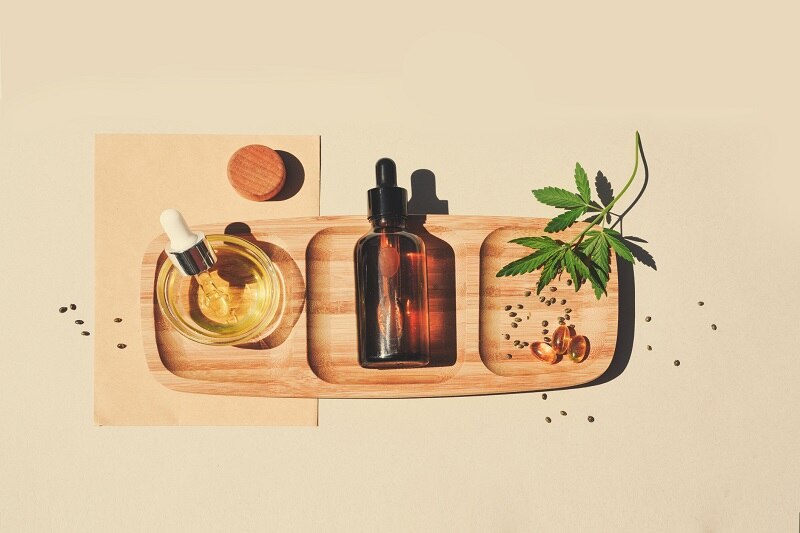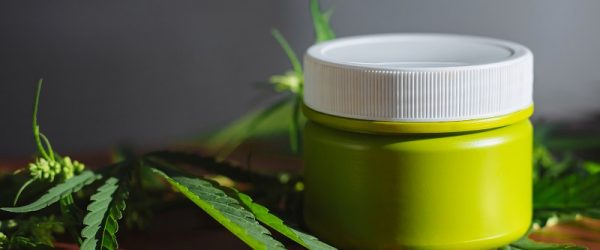Every body is different and what works for some might not be right for all. However, when it comes to the conversation around CBD, it seems like this magical compound can fix just about anything. Are the rumors true, or is CBD just another health industry band wagon? Let’s dive in.
What is CBD?
CBD, or cannabidiol, is one of more than a hundred chemical compounds found in the cannabis plant called cannabinoids.
Another cannabinoid you’ve likely heard of is THC, which offers psychoactive effects.
CBD, however, is a non-intoxicating cannabinoid and offers a bevy of therapeutic benefits.
Cannabinoids interact with our bodies via the endocannabinoid system (ECS). The ECS is made up of regulating receptors located all over the body, including brain, gut and skin to name a few. This explains why cannabinoid medicine, like CBD, is so versatile.
Potential health benefits of CBD
Humans have been using cannabis as medicine for thousands of years. In fact, the first recording of the cannabis plant being used to support health dates all the way back to 2800 BC, China in Emperor Shen Nung’s pharmacopeia. He prescribed cannabis to care for gout, rheumatism, malaria and even memory loss.
In more recent years, cannabis, particularly CBD, has been marketed to support myriad of other medical conditions, including anxiety, pain and poor sleep.
Anxiety: One of the most common mental health issues people experience is anxiety. Nearly 40 million Americans suffer from an anxiety disorder, and it’s one of the main reasons people turn to CBD.
A study published in Frontiers, which analyzed a group of Japanese teenagers with social anxiety disorder (SAD) found that CBD could be an effective option for support.
Yet another study published in NCBI found CBD to be a helpful natural solution for several anxiety disorders, including PTSD, specifically noting the regions of the brain affected by cannabidiol’s anxiolytic components.
Scientists are not certain exactly how CBD can support anxiety, but some research has shown that the cannabinoid can boost serotonin levels. Serotonin is a chemical in your brain that plays a role in your mood and is often found in anti-anxiety medications.
Pain: Another primary reason people use CBD is for pain relief. Studies suggest the compound may help relieve inflammation, which is often a factor in pain. CBD is also seen as a natural alternative to opioids or other prescription medication and has minimal side effects.
A 2017 study with over 1,200 participants found that CBD, when taken orally, helped manage chronic neuropathy (nerve related) pain in humans. Meanwhile, a study conducted on rats and the effects of CBD on arthritis found topical cannabidiol gel to reduce symptoms of inflammation and pain without evident side-effects.
In general, cannabis research is limited, but nevertheless when it comes to pain, CBD has shown promising possibilities as viable support.
Sleep: A good night’s sleep is essential to your overall health and wellbeing. According to experts, seven to nine hours of sleep is ideal, yet 35 percent of Americans report far fewer hours in bed nightly. There are many different types of sleep disorders keeping us awake at night, but CBD may be a plant-based solution to help you doze off.
One way CBD might help you achieve better sleep is via the regulation of cortisol, a stress hormone. People with insomnia have high levels of cortisol at night, but a 2019 study showed that CBD helped lower cortisol levels in participants, resulting in better sleep within the first month of consuming the cannabinoid.
CBD’s potential to reduce anxiety and pain may also help aid in deeper and better sleep.
Ways to consume CBD
There is a cornucopia of different ways to consume CBD, it’s all about finding the right modality for you.
Edibles: As in gummies or candies, are a popular option for consuming CBD discreetly, however because the cannabinoid gets broken down by the liver and digestive tract, it can take up to two hours to feel the effects.
Sublinguals: Like tinctures, sprays and oils, these are designed to be absorbed under the tongue. This method enables CBD to enter the bloodstream and bypass the digestive tract, helping to feel results quickly.
Topicals: We have loads of endocannabinoid receptors in our skin, thus using CBD-rich topicals, like lotions or creams, may provide localized pain relief, and has even been found to help with skin conditions like eczema. Due to our skin’s poor permeability, however, it’s best to use products with a high dosage of CBD for desired effects.
Tips for buying CBD
While CBD derived from hemp is federally legal in the United States, it is not yet regulated by the Food and Drug Administration (FDA), so researching CBD products before you buy is highly recommended. Case in point, a study published by the National Institute of Health showed that of 84 CBD products tested, 26 percent of them contained less CBD than stated on their labels.
Here’s what to look for in a product.
Full or broad-spectrum CBD: Full spectrum CBD contains all cannabinoids in the cannabis plant, including THC (in negligible amounts that will not get you high). Broad spectrum CBD contains most cannabinoids but often with the exception of THC. Research has found that CBD works better when taken with other cannabinoids. This whole plant medicine approach is best supported by the “entourage effect” theory.
Lab-tested: Make sure your CBD products have been tested by a third party. A quick Google search can help you determine if the product you’re looking at is legit and truly contains what it says it does.
U.S.-grown and organic: If CBD is from America, it cannot legally contain more than 0.3 percent THC. And organic CBD products mean you are far less likely to consume undesirable pesticides or other chemicals.
Good luck on your CBD journey!
Because of cannabis’s complicated legal status, research on the plant and its cannabinoid components is limited. However, there are numerous studies released every day around the globe that support the benefits of cannabis medicine.
If you choose to embark on a CBD journey, it’s important to stay open minded and try out what works best for you. Take note of how certain products make you feel, and don’t be afraid to switch it up! Ultimately, if you’re not certain about adding CBD to your medicine cabinet, be sure to check in with a doctor. And for more resources check out:




